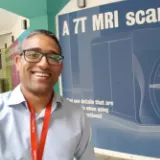I’m a strong believer in open and reproducible research but found that the short description included with many papers wasn’t detailed enough to make this possible. Being able to replicate a study is a key part of the scientific process, and I think with the complexity of modern methods (especially where software is involved), the only way to enable this is to share the code. Based on our positive experience, the journal Magnetic Resonance in Medicine will now adopt this permanently, and we encourage other journals to do the same!
Dr Shaihan Malik, Head of the Department of Imaging Physics and Engineering, School of Biomedical Engineering & Imaging Sciences.
29 October 2024
Sharing code for community review improves MRI research efforts
King's researchers with the journal for Magnetic Resonance in Medicine have trialed open 'code reviews' to improve the quality and usability of shared code among research groups.

For the last year the Reproducible Research study group of International Society for Magnetic Resonance in Medicine (ISMRM) chaired by Dr Shaihan Malik of the School of Biomedical Engineering & Imaging Sciences (BMEIS) has been trialling an open source 'code review' initiative for a leading journal in the field of Magnetic Resonance Imaging (MRI).
The initiative was created to support authors who want to publish their code alongside research papers with the aim of a 'no-judgement' review to catch errors and omissions and improve the quality of shared code, which ultimately leads to more reproducible science.
Dr Malik explains: "More and more researchers are now sharing code, particularly since it has been mandated by many research funders. However, code that is shared isn’t always valuable – sometimes it doesn’t work because of mistakes or because pieces are missing. Scientists sharing code are often not great software engineers, and things don’t get systematically tested – these are mistakes made in good faith, but they do still limit reproducibility.
"To try to change this, we (the RRSG) have been trialling a ‘code review’ facility with the journal Magnetic Resonance in Medicine – the idea is authors can opt to have their code checked independently. This check is non-judgemental (untidy code that still works is fine!) and we don’t comment on the science, just the code. I’ve been coordinating this over the last year and have been struck by how enthusiastic the reviewers from all over the world are, and how the majority of code has been improved by this process."
Dr Shaihan Malik's research focuses on the physics of MRI, particularly in imaging using ultrahigh field MRI systems. He is currently technical lead for the 7T London Collaborative Ultrahigh field System (LoCUS) and leads a program of research aiming to push this powerful technology into new clinical and biomedical applications including young children and infants.
He is a proponent of open science and reproducible research and regularly makes code available at https://github.com/mriphysics.

